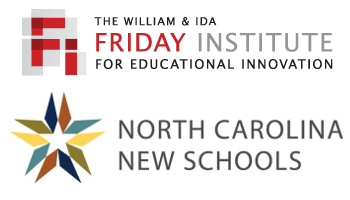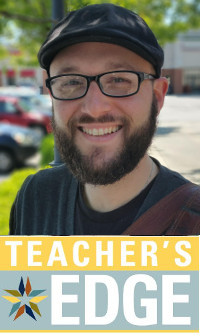|
|
Bringing competency-based education to NC
|

Competency-based education could transform the lives of North Carolina's students, but would require a systemic and sustainable change in the state's approach to schooling, according to a new conceptual framework released jointly by the Friday Institute for Educational Innovation and North Carolina New Schools. The report follows a work session convened by the two groups with various national and state competency-based education (CBE) experts late last year to understand how other states have made CBE work and to determine if it is right for North Carolina.
Competition in the global marketplace, coupled with lagging proficiency in college and career readiness, has accelerated the need to embrace innovative methods of educating students, particularly those with economically disadvantaged backgrounds. For any educational innovation to be both successful and impactful, it must be student-centered and personalized. To meet these demands, states like New Hampshire and Maine have implemented competency-based education (CBE) practices within their K-12 systems -- with great success. Under a CBE provision, local education agencies award students credit in a particular course without requiring the student to complete classroom instruction for a certain amount of seat time, so long as the student has demonstrated a sufficient level of understanding in that subject. The potential for CBE is enormous, but implementation of such a broad change in pedagogical ideology is daunting.
|
|
Partner districts named in rural education effort
|
 School districts in six North Carolina counties and four additional states will partner with NC New Schools in an expanded effort to open doors to higher education for more students in rural communities. Duplin, Harnett, Hertford, Rutherford, Scotland and Surry counties and agencies in Illinois, Indiana, Mississippi and South Carolina will join the Rural Innovative Schools initiative, funded by a $20 million federal grant and additional private investment. The initiative addresses the unique challenges of high-need students in rural areas by:
- radically changing expectations for college and career readiness;
- developing strong leadership at the classroom and school levels;
- promoting policies that lead to high-quality teaching and learning; and
- cultivating business and community partners to engage education as a regional economic driver.
Through the initiative, NC New Schools will deliver customized professional learning for teachers and administrators, provide design and planning support for districts, and offer statewide capacity-building efforts for greater implementation of proven college readiness strategies.
|
|
Unpacking the "co-" in co-planning
|
By Blake Wiggs, NC New Schools instructional coach

Co-planning with partnering teachers gets me excited. But as an instructional coach, I've learned that it can be uncomfortable for many in the classroom -- especially for a beginning teacher. A sense of self-consciousness or fear of judgement can make a teacher hesitant to engage in collaborative planning for courses.
Despite the discomfort, I've found that co-planning can be really helpful in clarifying what we are trying to accomplish with our students. As teachers, we may know what we expect, but it can be challenging to articulate those expectations to our students.
In order for co-planning to be successful, it is important to recognize several important components:
- Finding collaborative space
- Establishing norms and outcomes
- Capturing ideas
- Defining space and time
- Curating resources for online collaboration
- Asking questions to help guide the process
Read more about the key elements required for successful co-planning...
|
|
Summertime filled with learning for educators
|
|
Think being a teacher means relaxing all summer?
Guess again.
For educators in the NC New Schools network, the summer months bring a plethora of opportunities for learning and professional growth. Here's just a sampling of what our network teachers, counselors, college liaisons, principals and other partners will be doing this summer:
- Summer Institute: This three-day professional learning extravaganza serves as a catalyst for learning and building community, as teams from innovative schools and districts across the state connect in sharing share successes, learning promising practices, and planning next steps for deepening fidelity to the NC New Schools Design Principles. Dr. Daniel P. King, superintendent of Pharr-San Juan-Alamo ISD, and Sam Seidel, author of Hip Hop Genius, and student experience lab director for the Business Innovation Factory, will present as keynote speakers.
- STEM Industry Day: This one-day event before Summer Institute brings teachers and principals into area STEM-related businesses to develop a deeper understanding of STEM challenges, learn about current research and participate in exploratory activities with STEM professionals.
- Industry-Based Externships: Teachers are hired for 3-6 weeks in paid, full-time professional positions that provide direct experience in an industry or higher education work environment. This year's sites include BASF, Duke Energy, LORD Corporation, the National Institute for Environmental Health Sciences, Syngenta Crop Protection and the Wake Forest Institute for Regenerative Medicine.
- LEAD Institute: Principals from across the NC New Schools network come together for this intensive three-day summer experience focused on the knowledge and skills, attitudes and beliefs, and norms of professional behaviors for successful leaders.
- Core-Plus Mathematics Workshop: This four-year integrated curriculum features interwoven strands of algebra and functions, statistics and probability, geometry and trigonometry, and discrete mathematics. The curriculum emphasizes mathematical modeling and is designed to make mathematics accessible to more students, while challenging the most able students. (Registration open to all educators)
- Modeling Instruction in Science Workshop: This approach is dedicated to research-based reform of science instruction and sustained professional growth and support for science teachers. Modeling Instruction is a guided inquiry approach to teaching science where students create and apply conceptual models of natural phenomena as a central aspect of learning and doing science. (Registration open to all educators)
- Project-Based Learning Workshops: Two different sessions are geared toward beginning and experienced PBL teachers. One will teach key principles for designing and managing standards-focused projects, while the other will allow participants to share their work, gather ideas, tune plans and form a peer support network to encourage continued collaboration around the PBL pedagogy. (Registration open to all educators)
- Performance Task Academy: This two-day workshop is designed in partnership with CWRA+ to help educators develop performance tasks, like those used in the CWRA+, that align both to the content they teach and relevant problems being addressed by local industry. Incorporating performance tasks in the classroom develops critical thinking and problem-solving skills in students. Participants will collaboratively develop performance tasks and will leave with tangible performance tasks of their own to implement in their classrooms.
- Principles and Practices of Critical Friendship: Participants are trained to serve as Critical Friend leaders to support teacher collaboration and growth through the use of protocols for examining student and teacher work, solving problems, setting goals, observing peers, examining inequities in the classroom and building teams.
|
|
|
Thanks for subscribing to INNOVATOR, an update on school and district transformation from North Carolina New Schools. Our newsletter aims to inform practitioners, policy makers and friends of public education on innovation, workforce development, research and success stories from schools, districts and regions across the state. Please contact us to provide feedback and suggest ideas.
|
|
|
 |
 |
|
|